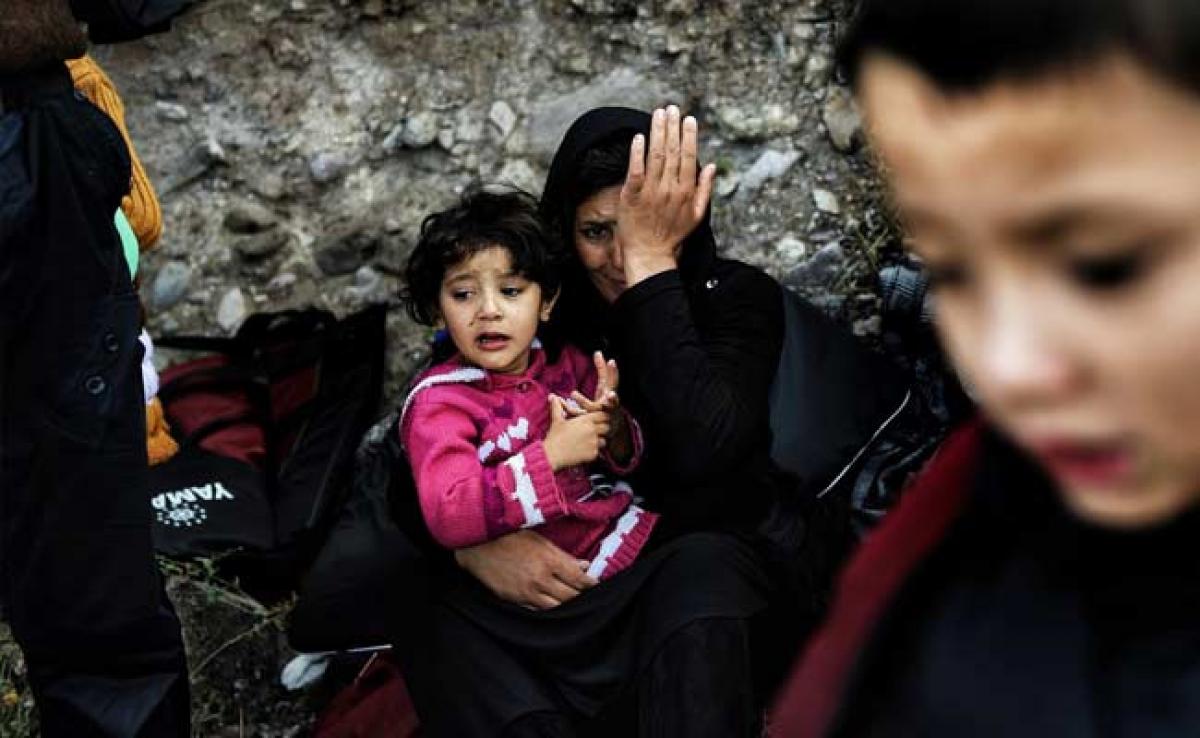Live
- Govt plans to establish offshore Johns Hopkins University Campus in India
- Goa Aces clinch Indian Racing League title
- Study finds how hormone therapy can reshape the skeleton
- High-street fashion players looking at India for manufacturing: Report
- Shreyas Iyer to lead Mumbai as Prithvi Shaw returns for Syed Mushtaq Ali Trophy
- 'Failed to resolve crisis': NPP withdraws support from BJP govt in Manipur
- Chennai: Actress Kasturi Remanded in Custody Until 29th of This Month
- Aaqib Javed likely to become Pakistan's new white-ball head coach
- BJP panel to draft poll charge sheet against AAP govt in Delhi
- Allu Arjun Thanks Fans in Patna, Teases 'Pushpa 2' Release
Just In

x
Highlights
For the thousands of refugees and migrants landing on its beaches every day, Greece\'s Lesbos island is a step to safety and a brighter future in Europe.
For the thousands of refugees and migrants landing on its beaches every day, Greece's Lesbos island is a step to safety and a brighter future in Europe.

But the continent's biggest migration challenge since World War II is now presenting an unexpected environmental headache: what to do with the vast heaps of lifejackets and inflatable boats left behind by the arrivals?
On the beach of Skala Sikaminias on Lesbos' northern coast, a key landing point for migrants, a group of municipal employees are loading discarded jackets and dinghies on a truck.
"We've barely finished when it's time to start all over again," sighs Yiorgos Katsanos, the deputy mayor in charge of waste management.
The city has mobilised 12 additional staff to handle the overload and sends two trucks and a crane to clear the beaches every day.
For the time being, the thousands of life vests and boats are deposited at a dump further north. Until a permanent decision on what to do with it emerges, they're being left there.
The municipal vehicles can only access areas served by roads, and there are plenty of inaccessible coves littered with debris.
"With materials such as these, the only solution is recycling," says Katsanos.
The plastic "could be used to make water tanks" to be used in fire-fighting, he notes.
"But we have not found a company prepared to undertake this job," he adds.
Lifejackets Turn Up on eBay
To some of the reporters and volunteers who gather on the beach each day to greet the arrivals, a lifejacket can be a kind of trophy.
Some have even ended up on Internet auction website eBay, "allegedly to finance humanitarian operations", says Katsanos.
"If only they actually saved lives. But no, they're junk" hastily made in Turkey or cheaply ordered from China, the deputy mayor adds.
"They were really flimsy, not very solid at all," says Sajjad, a 22-year-old Afghan who paid seven euros ($7.8) for his own life vest in Turkey.
As in the case of his fellow travellers, he discarded it as soon as he set foot on the island.
Sajjad said he was grateful he never actually had to use the vest, as he cannot swim.
More than half a million people have reached Europe via the Mediterranean this year including over 310,000 landing in Greece, figures from the UN refugee agency show.
Nearly 3,000 others have died or disappeared during the crossing.
Two more people a woman and a child drowned on Wednesday off Lesbos.
Greece and other European countries have repeatedly criticised Turkey for not doing enough to stamp out smuggler networks that profit at the expense of the migrants, many of whom are fleeing the conflict in Syria.
The smugglers charge exorbitant prices up to $2,000 for passage on board flimsy vessels that frequently sink, dooming entire families.
In mid-September, France suspended an honorary consul and maritime supplier in the Turkish holiday resort town of Bodrum who was secretly filmed by France 2 television selling dinghies to refugees.
But there are also questionable practices closer to home.
On Lesbos, after the migrants and volunteers who help them have moved on, locals derisively known as "crows" move in to scavenge what they can.
The gutted boats will never sail again but plastic can be reused for making tarpaulin, and wood for fences.
Engines can also be resold at a tidy profit.
On the neighbouring island of Leros, police recently arrested four people found to have appropriated a combined 35 engines from migrant boats.
"There's a black market for everything," said Michalis Dimou, a local coastguard.
"We've arrested a few people but right now the priority lies elsewhere," he shrugs.

Next Story
More Stories
ADVERTISEMENT
© 2024 Hyderabad Media House Limited/The Hans India. All rights reserved. Powered by hocalwire.com







